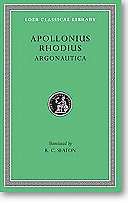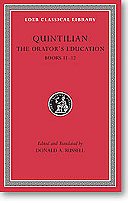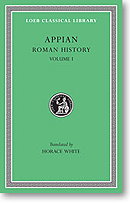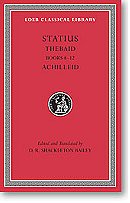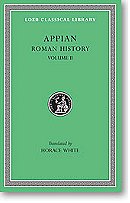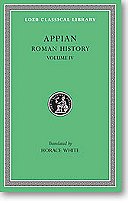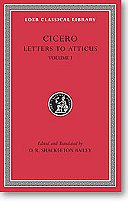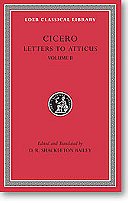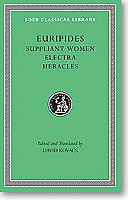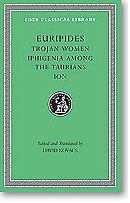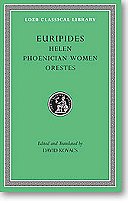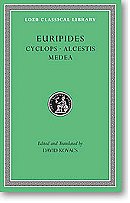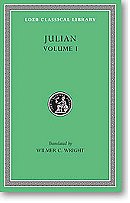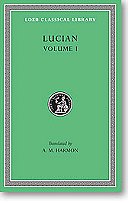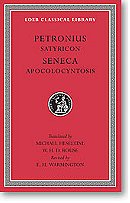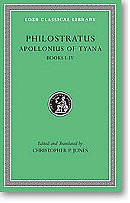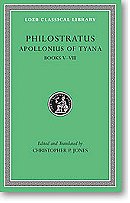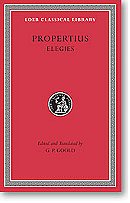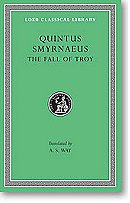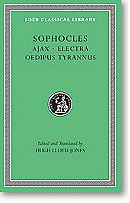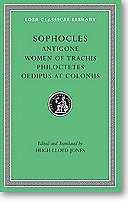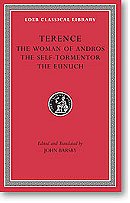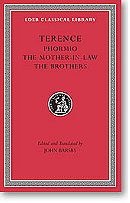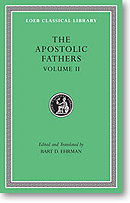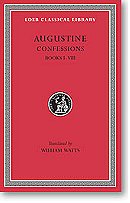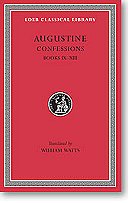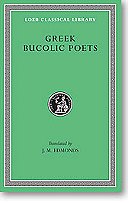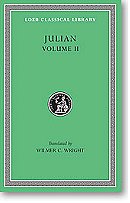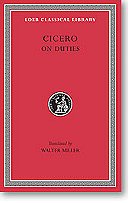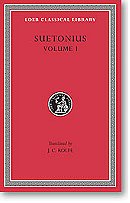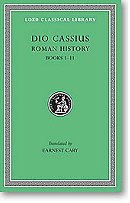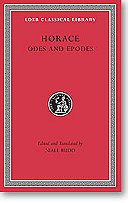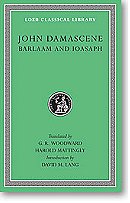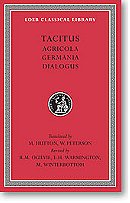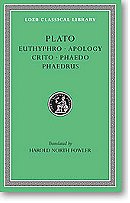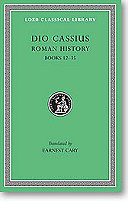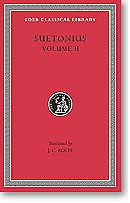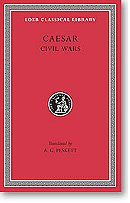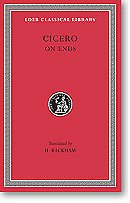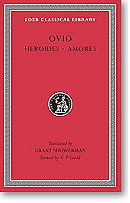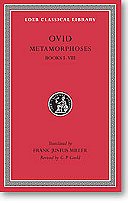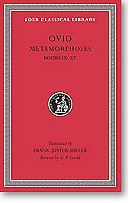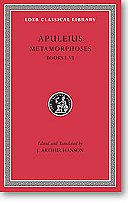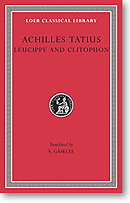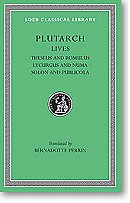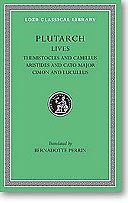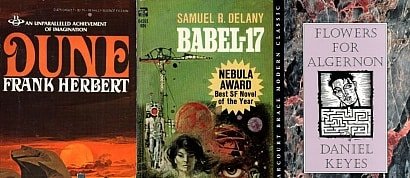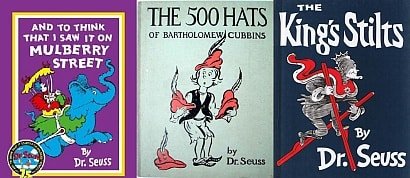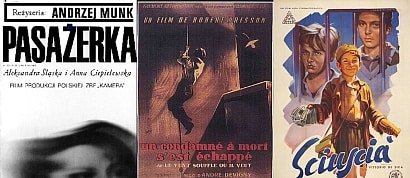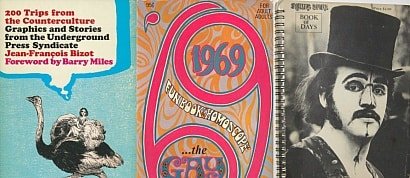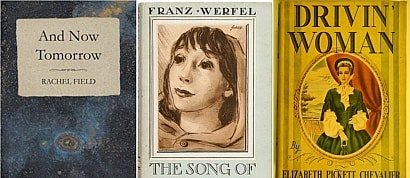Loeb Classical Library
Sort by:
Showing 1-50 of 506
Rating:
List Type:
Argonautica (Loeb Classical Library) - Apollonius Rhodius,William H. Race
Argonautica, composed in the 3rd century BCE, is the epic retelling of Jason’s quest for the golden fleece. It greatly influenced Roman authors such as Catullus, Virgil, and Ovid, and was imitated by Valerius Flaccus. This new edition of the first volume in the Loeb Classical Library offers a fresh translation and improved text.
Roman History, Volume I (Loeb Classical Library)... - Appian,Horace White
Appian's history of the rise of Rome is a record of expansion and conquests. In his animated narrative the historian--a Greek from Alexandria--often shows us events from the point of view of the conquered peoples. His accounts of the Spanish, Hannibalic, Punic, Illyrian, Syrian, and Mithradatic wars are in Volumes I and II.
Statius, III: Thebaid, Books 8-12. Achilleid (Loeb Classical Library)... - Publius Papinius Statius,D. R. Shackleton Bailey
The extant portion of Statius's unfinished Achilleid is strikingly different in tone: this second epic begins as a charming account of Achilles' life. This two-volume edition of the epics completes Shackleton Bailey's new edition of Statius.
Roman History, Volume III (Loeb Classical Library)... - Appian,Horace White
Appian's Civil Wars, in Volumes III and IV of the Loeb series, is the only surviving continuous narrative of the period from the Gracchi to the Roman annexation of Egypt.
Catullus. Tibullus. Pervigilium Veneris (Loeb Classical Library)... - Catullus,F. W. Cornish,J. P. Postgate,J. W. Mackail,G. P. Goold
The previous bowdlerized edition of Catullus is completely revised and corrected here. This Second Edition restores lines that had been omitted from the Latin text for their "indecency," and provides a complete and accurate re-translation. The text of Tibullus has been emended; the text of Pervigilium Veneris has been thoroughly corrected and the translation revised.
Cicero, XXII: Letters to Atticus, Volume I (Loeb Classical Library)... - Marcus Tullius Cicero,D. R. Shackleton Bailey
In letters to his dear friend Atticus, Cicero reveals himself as to no other of his correspondents except, perhaps, his brother. These letters, in this four-volume series, also provide a vivid picture of a momentous period in Roman history--years marked by the rise of Julius Caesar and the downfall of the Republic. D. R. Shackleton Bailey's authoritative edition and translation of the Letters to Atticus is now added to the Loeb Classical Library (replacing an outdated edition); it is a revised version of his Cambridge Classical Texts and Commentaries edition, and includes many explanatory notes.
Cicero, XXIII: Letters to Atticus, Volume II (Loeb Classical Library)... - Marcus Tullius Cicero,D. R. Shackleton Bailey
Euripides, III (Loeb Classical Library) - Euripides,David Kovacs
Centering on the right of proper burial for those fallen in battle, Suppliant Women reflects on war and on the rule of law. In Electra Euripides gives us his version of the famous legend of the murder of Clytaemestra by her children in revenge for her killing their father--a portrayal interestingly different from that in Sophocles' Electra. Narrating sudden reversals in the hero's fortunes, Heracles testifies to the fragility of human happiness.
Euripides, IV (Loeb Classical Library) - Euripides,David Kovacs
Trojan Women, a play about the causes and consequences of war, develops the theme of the tragic unpredictability of life. Iphigenia among the Taurians and Ion exhibit tragic themes and situations (the murder of close relatives); each ends happily with a joyful reunion.
Euripides, V (Loeb Classical Library) - Euripides,David Kovacs
In this fifth volume of the new Loeb Classical Library Euripides, in Helen the poet employs an alternative history in which a virtuous Helen never went to Troy but spent the war years in Egypt, falsely blamed for the adulterous behavior of her divinely created double in Troy. This volume also includes Phoenician Women, Euripides' treatment of the battle between the sons of Oedipus for control of Thebes; and Orestes, a novel retelling of Orestes' lot after he murdered his mother, Clytaemestra. Each play is annotated and prefaced by a helpful introduction.
Euripides, I (Loeb Classical Library) - Euripides,David Kovacs
One of antiquity's greatest poets, Euripides (ca. 485-406 BCE) has been prized in every age for the pathos, terror, surprising plot twists, and intellectual probing of his dramatic creations. He wrote nearly ninety plays, of which eighteen have come down to us (plus a play of unknown authorship long included with his works). In this new Loeb Classical Library edition of Euripides, David Kovacs presents a freshly edited Greek text and an accurate and graceful translation with explanatory notes.
Cyclops is a satyr play, the only complete example of this genre to survive. Alcestis tells the story of a woman who agrees--in order to save her husband's life--to die in his place. Medea is the quintessential tragedy of revenge: Medea kills her own children, as well as their father's new wife, to punish him for desertion.
Cyclops is a satyr play, the only complete example of this genre to survive. Alcestis tells the story of a woman who agrees--in order to save her husband's life--to die in his place. Medea is the quintessential tragedy of revenge: Medea kills her own children, as well as their father's new wife, to punish him for desertion.
Julian, I, Orations 1-5 (Loeb Classical Library)... - Julian,Wilmer C. Wright
Wilmer C. Wright, Translator
Julian's surviving works, all in Greek, are given in the Loeb Classical Library in three volumes: the eight Orations (1–5 in Volume I, 6–8 in Volume II) include two in praise of Constantius, one praising Constantius's wife Eusebia, and two theosophical hymns (in prose) or declamations, of interest for studies in neo-Platonism, Mithraism, and the cult of the Magna Mater in the Roman world.
Julian's surviving works, all in Greek, are given in the Loeb Classical Library in three volumes: the eight Orations (1–5 in Volume I, 6–8 in Volume II) include two in praise of Constantius, one praising Constantius's wife Eusebia, and two theosophical hymns (in prose) or declamations, of interest for studies in neo-Platonism, Mithraism, and the cult of the Magna Mater in the Roman world.
Lucian, Volume I (Loeb Classical Library) - Lucian,A. M. Harmon
Satire blends with comic art in Lucian's tales, fantasies, and dialogues. With ebullient wit he mocks teachers of literature, the various philosophical schools, popular religions, historians and writers, the Olympian gods, and the foibles of mortals. In The Dream he jocularly recounts his own career. Native of Samosata on the Euphrates, Lucian traveled widely in the Roman Empire as far as Gaul. His 80 extant works (published here in 8 volumes) offer insight on the intellectual world of the second century CE along with mischievous and sophisticated entertainment.
Satyricon. Apocolocyntosis (Loeb Classical Library)... - Petronius,Seneca,M. Heseltine,W. H. D. Rouse,E. H. Warmington
Petronius's picaresque novel (probably written during Nero's reign) presents in lurid detail the disreputable travels and adventures of Encolpius, a swashbuckling young coward lacking both morals and income. It has been called a kaleidoscope picture of literature, lust, and life. Perhaps best known are the chapters describing Trimalchio's wildly extravagant dinner party with rambunctious entertainment. For the revised edition, Warmington debowdlerized Heseltine's translation and expanded the explanatory notes. This volume also contains Apocolocyntosis, the satire on the death and apotheosis ("pumpkinification") of the emperor Claudius which is attributed to Seneca.
Apollonius of Tyana, I: Life of Apollonius of Tyana, Books 1-4 (Loeb Classical Library)... - Philostratus,Christopher P. Jones
This biography of a first-century C.E. holy man has become one of the most widely discussed literary works of later antiquity. With an engaging style, Philostratus portrays a charismatic teacher and religious reformer from Tyana in Cappadocia (modern central Turkey) who travels across the known world, from the Atlantic to the Ganges. His miracles, which include extraordinary cures and mysterious disappearances, together with his apparent triumph over death, caused pagans to make Apollonius a rival to Jesus of Nazareth.
Apollonius of Tyana, II: Life of Apollonius of Tyana, Books 5-8 (Loeb Classical Library)... - Philostratus,Christopher P. Jones
This biography of a first-century C.E. holy man has become one of the most widely discussed literary works of later antiquity. With an engaging style, Philostratus portrays a charismatic teacher and religious reformer from Tyana in Cappadocia (modern central Turkey) who travels across the known world, from the Atlantic to the Ganges. His miracles, which include extraordinary cures and mysterious disappearances, together with his apparent triumph over death, caused pagans to make Apollonius a rival to Jesus of Nazareth.
Elegies (Loeb Classical Library) - Propertius,G. P. Goold
The passionate and dramatic elegies of Propertius gained him a reputation as one of Rome's finest love poets. Here he portrays the uneven course of his love affair with Cynthia and also tells us much about the society of his time. And in later poems he turns to the legends of ancient Rome. G. P. Goold's 1990 edition of the elegies of Propertius (revised in 1999) solves some long-standing questions of interpretation and delivers a faithful and stylish prose translation.
The Fall of Troy (Loeb Classical Library) - Quintus Smyrnaeus,A. S. Way
Quintus' work is a bold and generally underrated attempt in Homer's style to complete the story of Troy from the point at which the Iliad closes. Quintus tells us the stories of Penthesilea, the Amazonian queen; Memnon, leader of the Ethiopians; the death of Achilles; the contest for Achilles' arms between Ajax and Odysseus; the arrival of Philoctetes; and the making of the Wooden Horse. The poem ends with the departure of the Greeks and the great storm which by the wrath of heaven shattered their fleet.
Sophocles, I, Ajax. Electra. Oedipus Tyrannus (Loeb Classical Library)... - Sophocles,Hugh Lloyd-Jones
Hugh Lloyd-Jones gives us a new translation of the seven surviving plays of Sophocles. The facing Greek is the corrected version of the Oxford Classical Text edited by Hugh Lloyd-Jones and Nigel Wilson (1990). Volume I contains Oedipus Tyrannus, Ajax, and Electra.
Sophocles, II, Antigone. The Women of Trachis. Philoctetes. Oedipus at Colonus (Loeb Classical Libra... - Sophocles,Hugh Lloyd-Jones
Volume II contains Oedipus at Colonus, Antigone, Philoctetes, and The Women of Trachis.
Terence came to Rome from North Africa as a slave in the household of a senator who freed him. His six plays (all of them extant), first performed in the 160s BCE in Rome, were all based on New Comedy models--like other Roman comedies of the time. In contrast to the exuberance and buffoonery of Plautus, Terence gives us realistic scenes and witty, refined Latin. Volume I contains a substantial introduction and three plays: The Woman of Andros, a romantic comedy; The Self-Tormentor, which looks at contrasting father-son relationships; and The Eunuch, whose characters include the most sympathetically drawn courtesan in Roman comedy.
Terence, II, Phormio. The Mother-in-Law. The Brothers (Loeb Classical Library)... - Terence,John Barsby
The other three plays are in Volume II: Phormio, a comedy of intrigue with an engaging trickster; The Mother-in-Law, unique among Terence's plays in that the female characters are the admirable ones; and The Brothers, which explores contrasting approaches to parental education of sons.
The Apostolic Fathers, I, I Clement. II Clement. Ignatius. Polycarp. Didache (Loeb Classical Library... - The Apostolic Fathers,Bart D. Ehrman
The writings of the Apostolic Fathers give a rich and diverse picture of Christian life and thought in the period immediately after New Testament times. Some of them were accorded almost Scriptural authority in the early Church. This new Loeb edition reflects the latest scholarship.
The Apostolic Fathers, II, Epistle of Barnabas. (Loeb Classical Library)... - The Apostolic Fathers,Bart D. Ehrman
The writings of the Apostolic Fathers give a rich and diverse picture of Christian life and thought in the period immediately after New Testament times. Some of them were accorded almost Scriptural authority in the early Church. This new Loeb edition of these essential texts reflects current idiom and the latest scholarship.
Augustine, VIII: Confessions, Books I-VIII (Loeb Classical Library)... - Augustine,W. Watts
From Augustine's large output the Loeb Classical Library offers that great autobiography the Confessions (in two volumes).
Greek Bucolic Poets: Theocritus. Bion. Moschus (Loeb Classical Library)... - Theocritus,Bion,Moschus,J. M. Edmonds
Theocritus was the founder of bucolic or pastoral poetry. Of his so-called Idylls, 'Little forms' or pieces (not all are genuine), ten are about pastoral life real or idealised; several are small epics (three are hymns); two are beautiful 'occasional' poems (one about a country walk, one to accompany a gift of a distaff for the wife of his friend Nicias); six are love-poems; several are mimes, striking pictures of common life; and three are specially expressive of his own feelings. The 24 'Epigrams' were apparently inscribed on works of art. Moschus wrote a (lost) work on Rhodian dialect. Though he was classed as bucolic, his extant poetry (mainly 'Runaway Love' and the story of 'Europa') is not really pastoral, the 'Lament for Bion' not being Moschus's work. 'Megara' may be by Theocritus; but 'The Dead Adonis' is much later. Most of Bion's extant poems are not really bucolic, but 'Lament for Adonis' is floridly brilliant.
Julian, II, Orations 6-8. Letters to Themistius, To the Senate and People of Athens, To a Priest. Th... - Julian,Wilmer C. Wright
Julian's Misopogon (The Beard Hater) is a case of the satirist directing his sharp wit at himself: self-mockery employed to undercut the taunts of critics. When the citizens of Antioch jeered at the emperor's "philosophical" beard, he responded with a satire on his own appearance and austere life style. A work of ironic self-disparagement, Misopogon reflects strikingly on the emperor's personality. Julian's conception of the ideal ruler emerges through the satire of The Caesars. He begins with a reference to the Saturnalia, and his treatment of the gods here is appropriate to that festival. The piece contains some echoes of Lucian's satires--but Julian is nowhere as light-hearted as Lucian.
The Lives of the Caesars, I: Julius. Augustus. Tiberius. Gaius. Caligula (Loeb Classical Library)... - Suetonius,J. C. Rolfe,K. R. Bradley
Lawyer and for a time private secretary to the emperor Hadrian, Suetonius was a knowledgeable and diligent collector of facts about his world. His Lives of the Caesars and Lives of Illustrious Men are invaluable and fascinating sources of information. Seasoned with entertaining anecdotes and bits of scandalous gossip relating to the lives of the first 12 emperors, Suetonius's biographies offer a colorful picture of Roman imperial politics and society. His account of Nero's death is justly famous.
GemLil's rating:


Roman History, I: Books 1-11 (Loeb Classical Library)... - Dio Cassius,Earnest Cary,Herbert B. Foster
Of the eighty books of Dio's great work, Books 36-60 have come down to us (with some gaps). The facilities for research afforded by Dio's official duties--he held a number of high offices--as well as his own diligence make him a vital source for the history of this period.
Horace, I, Odes and Epodes (Loeb Classical Library)... - Horace,Niall Rudd
The poetry of Horace (born 65 BCE) is richly varied, its focus moving between public and private concerns, urban and rural settings, Stoic and Epicurean thought. Here is a new Loeb Classical Library edition of the great Roman poet's Odes and Epodes.
Barlaam and Ioasaph (Loeb Classical Library) - John Damascene,G. R. Woodward,Harold Mattingly,David M. Lang
One of the best known examples of the hagiographic novel, this is the tale of an Indian prince who becomes aware of the world's miseries, is converted to Christianity by the monk Barlaam, founds a Christian kingdom, and spends his later years as a hermit in the desert. Not until the mid-nineteenth century was it fully recognized that this Greek romance is actually the legend of the Buddha in a Christianized version. D. M. Lang's Introduction traces the parallels between the two stories, notes the influences of the Manichaean creed, and discusses the importance of Arabic versions of the legend.
Tacitus, I: Agricola. Germania. Dialogue on Oratory (Loeb Classical Library)... - Tacitus,M. Hutton,W. Peterson,R. M. Ogilvie,E. H. Warmington,M. Winterbottom
Dialogue on Oratory is a lively conversation of three friends--a lawyer, a poet, and a connoisseur of oratory--about declining standards in the art of public speaking (a question that also troubled Quintilian). The discussion, relaxed and urbane, is concerned with eloquence in both political and lawcourt speeches. This work by Tacitus has a distinctly Ciceronian air.
Plato, I, Euthyphro. Apology. Crito. Phaedo. Phaedrus (Loeb Classical Library)... - Plato,H. N. Fowler
Roman History, II: Books 12-35 (Loeb Classical Library)... - Dio Cassius,Earnest Cary,Herbert B. Foster
The Lives of the Caesars, II (Loeb Classical Library)... - Suetonius,J. C. Rolfe
This volume concludes Lives of the Caesars and also contains Lives of Illustrious Men.
Caesar, II, The Civil Wars (Loeb Classical Library)... - Caesar,A. G. Peskett
The history of the Roman Republic for the years 49-48 BCE centers on two striking personalities: Julius Caesar and Pompey. Caesar's account of the war between them, from its outbreak to the decisive battle of Pharsalus in 48--in lucid and spare prose--is here well translated by Peskett.
Ovid, I, Heroides. Amores (Loeb Classical Library)... - Ovid,Grant Showerman,G. P. Goold
The faithful Penelope, the forgiving Briseis, the reproachful Dido, the impassioned Medea--a procession of legendary women express their emotions and narrate their memories in the fictional letters to absent husbands and lovers that constitute Ovid's Heroides (Heroines). The moods and situations of these heroines vary widely, but their soliloquies are all dramatic. Six of the poems form exchanges, including an entertaining correspondence between Paris and Helen, and an exchange between Hero and Leander which immortalized their story. This volume also contains Ovid's Amores, three books of elegies ostensibly about the poet's love affair with his mistress Corinna (recalling the elegies of Propertius that revolve around Cynthia).
Ovid, III, Metamorphoses (Loeb Classical Library)... - Ovid,Frank J. Miller
In the Metamophoses Ovid retells in one poetic whole an enormous range of stories of classical mythology. Connected by the theme of miraculous change (hence the title), the narratives pass in review, from the dawn of creation down to the transfiguration of Caesar's soul into a star. Each important myth is touched upon and ingeniously linked to the next as the poet progresses through his historical account. Ovid's most influential work is here given a fluent prose translation.
Metamorphoses, I: Books I-VI (Loeb Classical Library)... - Lucius Apuleius,J. Arthur Hanson
The Metamorphoses of Apuleius, also known as The Golden Ass, is truly enchanting: a delightful romance combining realism and magic. The hero, Lucius, eager to experience the sensations of a bird, resorts to witchcraft, but an unfortunate pharmaceutical error turns him into an ass. The bulk of the novel recounts his adventures as an animal. Lucius also retails many stories he overhears, the most charming being that of Cupid and Psyche; some are as ribald as they are witty.
Leucippe and Clitophon: Achilles Tatius (Loeb Classical Library)... - Achilles Tatius,S. Gaselee
Leucippe and Clitophon, written in the 2nd century A.D., is exceptional among the ancient romances in being a first-person narrative: the adventures of the young couple are recounted by the hero himself. The colorful story Clitophon tells us includes shipwrecks, apparent deaths, attacks by pirates and brigands, abductions, and other frights and obstacles. Love triumphs in the end. Achilles Tatius' style is notable for descriptive detail and for his engaging digressions.
Parallel Lives, I (Loeb Classical Library) - Plutarch,Bernadotte Perrin
Most popular of Plutarch's writings have always been the 46 Parallel Lives, biographies planned to be ethical examples in pairs (in each pair, one Greek figure and one similar Roman). The irresistably humane Lives give not merely a record of careers and illustrious deeds but rounded portraits of statesmen, orators, and military leaders. For, Plutarch says: "It is not Histories I am writing, but Lives"; the virtues (or vices) and character of his subjects is what he seeks "and by means of these to portray the life of each."
Load more items (456 more in this list)
The Loeb Classical Library® is the only series of books which, through original text and English translation, gives access to all that is important in Greek and Latin literature. Epic and lyric poetry; tragedy and comedy; history, travel, philosophy, and oratory; the great medical writers and mathematicians; those Church fathers who made particular use of pagan culture--in short, our entire classical heritage is represented here in convenient and well-printed pocket volumes in which an up-to-date text and accurate and literate English translation face each other page by page. The editors provide substantive introductions as well as essential critical and explanatory notes and selective bibliographies.
(Arranged by series number with notes added from the Loeb Classical Library official website.)
Added to
Related lists
Drew From Classical And Post Classical Painting
322 item list by G̲lσb̶∆L J̅∆zZ∆l!s̲↱
19 votes 1 comment
1 comment
322 item list by G̲lσb̶∆L J̅∆zZ∆l!s̲↱
19 votes
 1 comment
1 comment
View more top voted lists
People who voted for this also voted for
Hugo Award - Best Novel
Nebula Award - Best Novel
Rolling Stone 500 Greatest Albums Part V 401 - 500
Rolling Stone 500 Greatest Albums Part IV 301-400
A Rainbow of Movies I - Red
Rolling Stone 500 Greatest Albums Part III 201-300
Dr Seuss
Most Successful Movies of... Tom Cruise
My Favorite Prison Movies
The British Royal Family on Film
Booker Prize Winners
So-called-hippie-era books
Rolling Stone 500 Greatest Albums Part II 101-200
Most Successful Movies of... Nicole Kidman
NY Times 40's
More lists from GemLil
My favourite dramas
Favourites
Self Preservation
Zoo Tycoon Collection (PC)
Best Artists of the 80s
Favourite kids TV
Old people's shows
 Login
Login
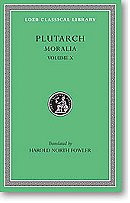
 1
1
 0
0
 0
0
